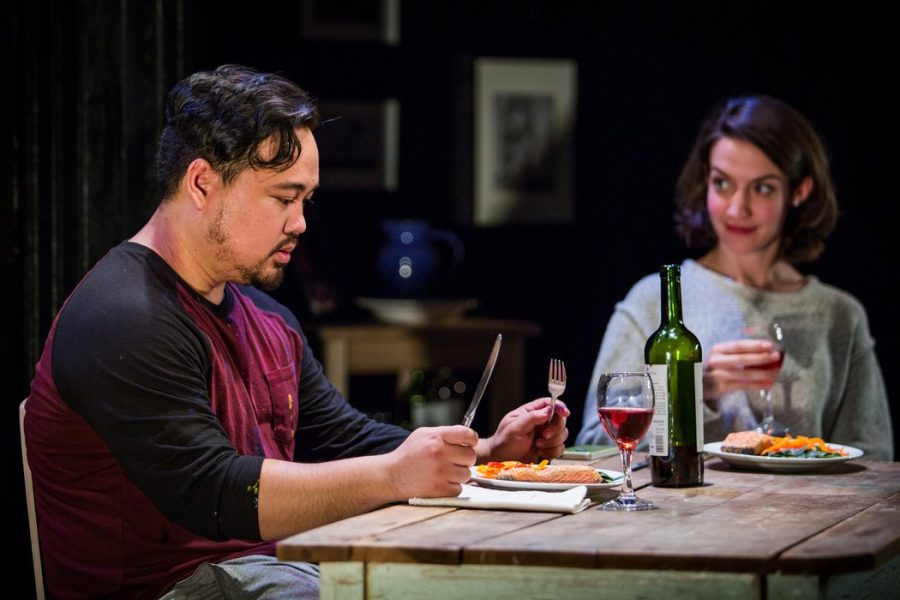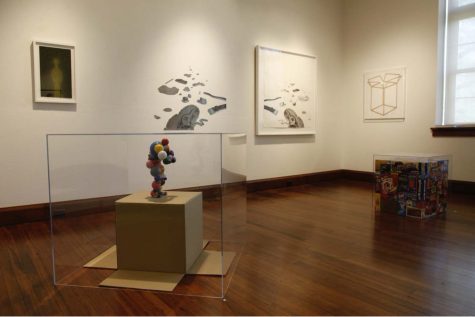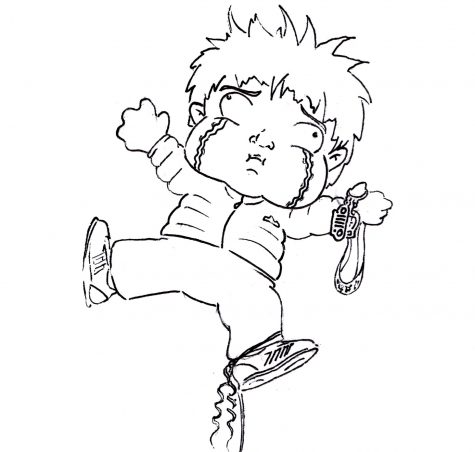The Feast: A Trippy Tale of Trolls and Toilets
November 28, 2017
Have you ever heard strange noises coming from the toilet that only you can hear? The Feast, a play written by Cory Finley ‘07 and directed by Theatre, Speech and Dance department chair John Pierson, features Matt, an artist, who hears eerie noises emanating from the toilet in his New York City apartment. A few scenes into the show, Matt sticks his head down the toilet pipes and encounters a civilization of trolls.
Yes, trolls. As if that weren’t enough, his girlfriend, Anna, doesn’t hear the noises or believe his stories about the trolls. The plot is helped along by the a character called “The Man,” who is really four different characters (a plumber, a psychologist, a man that Anna is having an affair with and Matt’s agent) played by one actor. The Man’s words, says Pierson, “shift between realistic and bizarre” and leave “the possibility that Matt was simply mishearing what was being said.”
The Feast was recently produced at the Gaslight Theatre by St. Louis Actors’ Studio; this was the second time The Feast has been produced, having made its debut in 2015 at The Flea Theater in New York under the title Sunk. According to Tina Farmer of KDHX, the play “smartly mixes the comic and disturbing, sometimes in surprisingly creepy ways, while creating interesting, complex situations grounded in our everyday relationships and interactions.”
Perhaps one of the most thought-provoking parts of the play is its ambiguous ending, which leaves the audience wondering whether Matt was mentally ill and hallucinating a visit to a civilization of trolls living in the toilet’s pipes, or whether the trolls were, in fact, real. When asked about the ambiguity, Finley shared that the “first draft of the play revealed that the supernatural world was indeed real,” but he prefers to allow the audience to decide for themselves. “I always think an audience gets the most out of a story when they’re forced to be actively engaged,” he said. “I love plays and movies that create that unsure state in me. I think it puts me on edge and makes me more receptive to the emotional content of the story. And if an ending can be ambiguous…then it keeps me actively wrestling with it afterward.”
Victoria Sansone ‘18, who saw The Feast as a member of the Contemporary Theatre class, said she “chose to think that Matt is mentally ill because I like that the play could be exposing the inner mind of someone with depression.” True to Finley’s goal, several other Contemporary Theatre students interviewed hadn’t made up their minds about the play’s ending.
Prior to seeing a performance of The Feast, the class read two early versions of the script, providing insight into the evolution of the play. Sansone remarked, “I loved [reading] the play in its early stages because it made its transformation on stage more amazing. When I read the first draft I was doubtful of the play’s brilliance but I was more than pleased with the final product.”
The Feast changed dramatically between these early scripts and the recent production, with new characters and scenes, as well as an entirely new ending. Pierson, who saw the first public reading of the script at HotCity’s Greenhouse festival and the first full production at The Flea, said that he suggested at least one of the changes: fully revealing the bathroom and the toilet. “Though the script didn’t disallow this interpretation (and, by the way, I don’t think it’s really a director’s place to create anything that the script doesn’t somehow allow for),” Pierson said, “it indicated that business in the bathroom should be unseen, and the New York production went that way.” Finley was “open to [Pierson’s] ideas and interpretations,” a flexibility which Pierson credited to “the JBS student-teacher relationship of mutual respect” without which “the eventual professional relationship wouldn’t work nearly so well today.”
The Feast, though bizarre, is, at the end of the day, a thought-provoking and entertaining play that successfully engages its audience. And, hey—the next time you’re having a bad day, just remember, it could be worse: you could have trolls screaming at you from the toilet.








